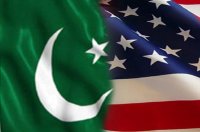 Ayaz Gul
Ayaz Gul
VOA News
November 6, 2017
ISLAMABAD, PAKISTAN — The United States has called on Pakistan to show “equal diligence” in fighting all terrorist groups operating in the country, including the Haqqani network, and cautioned bilateral relations are at a “critical juncture.”
U.S. Ambassador David Hale spoke at a seminar in Islamabad Monday as he discussed U.S. policy in relation to neighbors Pakistan and Afghanistan. Hale said that while the Trump administration’s recently announced South Asia strategy seeks a secure and stable Afghanistan, it looks to Pakistan for decisive action against all terrorist groups operating on its soil.
The American diplomat praised Pakistan’s efforts against anti-state terrorist groups, saying the country has been on the frontline in the effort to defeat al-Qaida and Islamic State in South Asia.
“We ask for equal diligence in decimating all the groups operating in Pakistan which threaten the region’s stability, including the Haqqani network. We seek a sustained and irreversible effort to achieve an aspiration and commitment that was made public by Pakistani officials themselves, and end to the use of Pakistan soil for attacks on its neighbors,” Hale noted.
Afghan and U.S. officials have alleged the Taliban and its Haqqani allies are directing the insurgency in Afghanistan from sanctuaries on Pakistani soil. The allegations have been at the center of Islamabad’s tensions with both Kabul and Washington.
Hale reiterated the U.S. is committed to denying the Taliban a military victory in Afghanistan and urged Pakistani leaders to assist in advancing a negotiated settlement to the conflict.
“Pakistani leaders have made clear that they share our goals for a peaceful and stable Afghanistan. It is now time to join in our efforts and create a context in which terrorist groups can no longer launch cross-border attacks and see no alternative to negotiations,” said the ambassador.
He repeated U.S. Secretary of State Rex Tillerson’s warning that Washington “will act accordingly” if Pakistan’s leaders choose “not to take advantage of this opportunity.”
Pakistan’s foreign minister, Khawaja Asif addressed the seminar and in responding to Hale’s comments, said security forces have dismantled terrorist networks on its soil and established government authority across the country.
Asif went on to say there may be remnants of these groups in Pakistan because of its porous border with Afghanistan and called for enacted U.S. intelligence cooperation to deal with them.
“Pakistan is committed to respond effectively to any actionable intelligence provided by the U.S. This is the only way forward to test each other’s resolve and commitment to combat terrorism,” Asif noted.
The foreign minister also said Trump’s Afghan strategy has created “needless divergence” in bilateral relations and cast doubts on whether it will promote peace in Afghanistan.
“Ladies and gentlemen, a conditions-based approach is primarily a strategy of denial and a strategic stalemate. It would more likely lead to further fragmentation and divisions within an already fractured society, making it that much more difficult to build peace mechanism and related structures,” Asif said.
He blamed “internal factors,” including rivalries within the Afghan government, for fueling war in the neighboring country, and called on both Kabul and Washington to pay attention to them rather than blaming Pakistan.
“Today, Afghanistan faces huge challenges with respect to corruption, building state institutions, transitioning from a war economy, record drugs production, ethnic and tribal divisions and expanding ungoverned areas; all these are monumental tasks and all are internal to Afghanistan,” Asif added.
The minister said Pakistan will do all it can to further an Afghan peace and reconciliation process, saying Islamabad has intensified interactions with Kabul and proposed working groups and mechanisms to build mutual trust and cooperation.
Asif blamed rival India for facilitating terrorist actions in the region but said U.S. officials have noted Pakistan’s concerns about giving New Delhi a wider role in the new Afghan strategy. India maintains it is helping Afghanistan in reconstruction efforts and dismisses Pakistani allegations.
“The U.S. assured us that India’s role in Afghanistan is limited to economic assistance and that the U.S. would not tolerate Afghan soil to be used against Pakistan,” said Asif.
Asif also said his government believes repatriation of around 3 million Afghan refugees from Pakistan will address the issue of terrorism facing both countries. Pakistani officials say anti-state militants operating on both sides of the border use the refugee population for sheltering and planning terrorist attacks.

